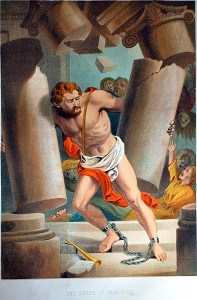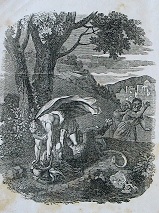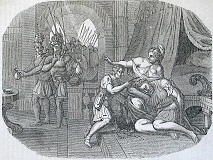Bible Stories for Grown-ups: Samson and Delilah
Judges 13:1-25 (10/5/2009)
"Samson and Delilah" is a long, exasperating story. Children do know the essentials. They know that Delilah cut Samson's hair and betrayed him to the Philistines. Some of them know that he was blinded. There's a children's book out on the grandkid's bookcase in my living room that even tells how he died. (Grimm's version, probably.) Even so, there are some interesting details that we probably don't burden the kids with, and this week we'll take a look at them.
The reason I say this story is exasperating is that Samson had great gifts, but he threw them all away. He was a special child. Born to a barren mother, he was dedicated as a Nazirite from conception. He was supposed to begin the work of rescuing the Israelites from the Philistines.
First let me say a little bit about the time of the Judges. The 12 tribes did not have any central government. Most of the time the elders of each tribe ran things, which is pretty much the system that is still used in that part of the world. However, if you read Judges, you see a cyclical pattern of apostasy of one or more tribes, oppression by a foreign people, repentance, the raising of a judge by God, throwing off the oppression, worship of God during the lifetime of the Judge, and then apostasy again. A judge was a charismatic leader chosen by God - usually a military leader, and sometimes a religious leader. The book of Judges talks about 13 judges, although 6 are mentioned only briefly. Samson was one of the judges, and he gets more pages than any other judge except Samuel (who has his own book). Mostly, however, Samson serves as a really bad example.
Judges 14:1-20 (10/6/2009)
Judges 15:1-20 (10/7/2009)
- Samson had more brawn than brain,
But he did well at doggerel.
- With the jawbone of an ass: a mass of masses.
With the jawbone of an ass, I killed a thousand men.
Sometimes the second line amplifies the first by giving a second example:
- The LORD is good.
He's also generous.
- The LORD is truthful.
He never lies.
Judges 16:1-20 (10/8/2009)
Samson's hair was only indirectly related to his strength. He was a Nazirite from conception, and God had given him the gift of great strength. His hair was the symbol of his Nazirite vow, and his strength was a gift associated with his Nazirite vow. When his head was shaved, the term of the vow was up, accident or not. The gift of strength that was associated with the vow left him immediately.
Judges 16:21-31 (10/9/2009)
If a Nazirite's vow was interrupted, he (or she) had to shave his head and start over. This is essentially what happened to Samson after his hair was cut. As the symbol of his vow returned, so did his remembrance of his responsibilities. Samson is only recorded as praying twice. The first time, in Judges 15:18, he complains that he's thirsty, and God gives him water. At the end of his life, he seems to realize that his strength came from God, and he prays that God will renew his strength. Even so, his motive is revenge. What could Samson have accomplished if he had used his God-given strength for God's purposes, instead of his own?
Copyright 2009, 2011 by Regina L. Hunter. All rights reserved.
The illustration showing the death of Samson is from the Binns family Bible, now in the private collection of Regina L. Hunter. The woodcuts are from the family Bible of John O. Spencer and Lydia Bunn, married 18 Nov. 1857 in Hector, Schuyler Co., NY. A complete listing of the posted images from this Bible is given at Ducks in a Row, Inc.
Opinions expressed on this page are solely those of the author, Regina Hunter, and may or may not be shared by the sponsors or the Bible-study participants. Thanks to the Holy Spirit for any useful ideas presented here, and thanks to all the readers for their support and enthusiasm. All errors are, of course, the sole responsibility of the author.
Our Sponsors:
St. John's United Methodist Church, "Transforming Lives Through Christ."
2626 Arizona NE, Albuquerque, New Mexico 87110
St. John's Music Ministries now has a YouTube channel, bringing you free concerts and choral music. Check it out!
Traditional worship services are held Sundays at 8:15 and 11:00 a.m. in the sanctuary. Casual worship services are held Sundays at 9:30 a.m. in the Family Life Center. Jazz Vespers are held monthly on the second Saturday at 5:00 p.m. in the sanctuary. St. John's feels especially called to the worship of God and to the service of our neighbors through our music program.
Storm Dragon SoftwareTM
Ducks in a Row, Inc.
This website is supported in part by the generosity of Mrs. J. Jordan.


